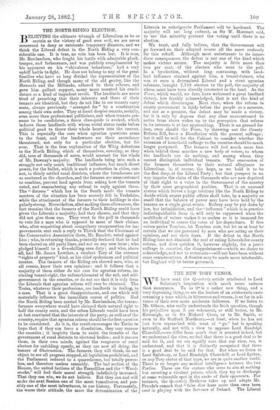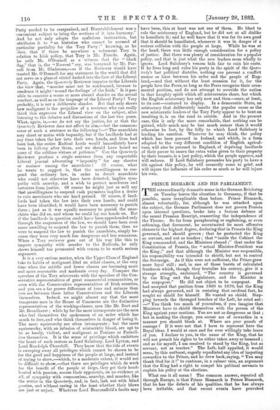THE NEW TORY VENOM.
WE have read the Quarterly article attributed to Lord Salisbury's inspiration with much more sadness than annoyance. To us it is a rather new thing, and a very depressing thing, to see the leaders of an aristocratic caste assuming a tone which, in bitterness and venom, is so far in ad- vance of their own more moderate followers. If we listen to Mr. Gibson, who really understands the Irish question, though his prejudices upon it are vehement, or still better, to Mr. Kavanagh, or to Sir Richard Cross, or to Mr. Smith, or even to Sir Stafford Northcote,—at least, when he has not just been reproached with want of "go," but is speaking naturally, and not with a view to appease Lord Randolph Churchill,—we differ from much that is asserted indeed, but we understand the view, we feel that there is a good deal to be said for it, and we are equally sure that our view, too, is understood, and that it is distinctly recognised that there
is a good deal to be said for that. But when we listen to Lord Salisbury, or Lord Randolph Churchill, or Lord Lytton, or any Tory orator of that type, we are in quite another world. There is no longer any mutual intelligence between the two Parties. These are the orators who seem to aim at nothing but secreting a virulent poison, which they try to discharge
at some vulnerable spot in the ranks of their opponents. For instance, the Quarterly Reviewer takes up and adopts Mr.
Froude's remark that "false dice have more than once been used in playing with the fortunes of Ireland. The Liberal
Party needed to be reorganised, and Disestablishment was a convenient subject to bring the sections of it into harmony." And he not only adopts the malicious insinuation, but attributes it to "an historian who cannot be accused of particular partiality for the Tory Party ;" knowing, as he dbes, that if there be anywhere a vehement Tory in relation to Irish policy, that Tory is Mr. Froude. Again, he calls Mr. O'Donnell as a witness that the " black flag," that is, the "No-rent" cry, was borrowed by Mr. Par- nell from Mr. Gladstone,—as if the Reviewer would have trusted Mr. O'Donnell for any statement in the world that did not serve as a glass of vitriol dashed into the face of the Liberal Party. Again, the Quarterly Reviewer imputes to the Liberals the view that, "murder must not be condemned, because to condemn it might wound the feelings of the Irish." Is it pos- sible to conceive a worse or more absurd slander on the actual conduct, as well as on the language of the Liberal Party? Very probably, it is not a deliberate slander. But that only shows how malignant is the prejudice of a reviewer who can really think this expresses the Liberal view on the subject, after listening to the debates and discussions of the last two years. What, again, is,—we do not say the justice, for at that the Quarterly Reviewer does not affect to aim,—but the common- sense of such a sentence as the following ?—" The anarchists may shoot or maim with impunity, but if the landlords had at any time taken the law into their own hands, and lives had been lost, the entire Radical horde would immediately have been in full-cry after them, and we should have heard no more of the sublime virtues of patience." Can the Quarterly Reviewer produce a single sentence from any respectable Liberal journal advocating " impunity " for any shooter
or maimer among the anarchists ? Of course, what he wants to suggest is, that the unwillingness to sus- pend the ordinary law, in order to detect anarchists who could not otherwise have been detected, implies sym- pathy with anarchy, and a wish to protect murderers and torturers from justice. Of course he might just as well say that unwillingness to suspend cash payments implies a desire to ruin merchants who are hard pressed. Of course, if land- lords had taken the law into their own hands, and could have been identified, it would have been necessary to punish them ; just as it was equally necessary to punish the anar- chists who did so, and whom we could lay our hands on. But if the landlords in question could have been apprehended only through the suspension of the law, we should have been even more unwilling to suspend the law to punish them, than we were to suspend the law to punish the anarchists, simply be- cause they were very much less dangerous and less numerous. When a Tory reviewer goes out of his way like this to impute sympathy with murder to the Radicals, he only shows himself too permeated with venom to be worth serious argument.
It is a very serious matter, when the Upper Class of England take to habits of malignant libel on other classes, at the very time when the middle and lower classes are becoming more and more reasonable and moderate every day. Compare the speeches of the Tory aristocrats with the speeches of the Con- servative representatives of great commercial communities, or even with the Conservative representatives of Irish counties, and you see a far graver difference of tone and animus than you see between these latter Conservatives and the Liberals themselves. Indeed, we might almost say that the most temperate men in the House of Commons are the distinctive representatives of the working-classes, men like Mr. Burt and Mr. Broadhurst ; while by far the most intemperate are the men who feel themselves the spokesmen of an order which has much to lose, and who think themselves in danger of losing it. The mere squirearchy are often intemperate ; but the mere squirearchy, with an infusion of aristocratic blood, are apt to be as heady, violent, and malignant as Fenians or Parnell- ites themselves. It is the sense of privilege which embitters the heart of such orators as Lord Salisbury, Lord Lytton, and Lord Randolph Churchill. They know that the tide of events is sweeping away all privileges which cannot be shown to be for the good and happiness of the people at large, and instead of trying to show,—which, to a moderate extent, it would not be difficult to show,—that there are privileges which do work for the benefit of the people at large, they get their heads heated with passion, accuse their opponents, on no evidence at all, of sympathy with communism, anarchy, and murder, like the writer in the Quarterly, and, in fact, lash out with blind passion, and without caring in the least whether their blows are just or unjust. Whatever Lord Beaconsfield's faults may have been, this at least was not one of them. He liked to rule the aristocracy of England, but he did not at all dislike to humiliate it ; and he well knew that it was for its own good that it should be humiliated, whenever it was in danger of a serious collision with the people at large. While he was at the head, there was little enough consideration for a policy of justice. But there was plenty of consideration for a popular policy, and that is just what the new leaders seem wholly to ignore. Lord Salisbury's venom bids fair to ruin his caste. If he lives long and rules his party in the spirit of the Quar- terly's last political diatribe, nothing can prevent a conflict sooner or later between his order and the people of Eng- land,—and that without the least occasion for it, for the people love the Peers, so long as the Peers recognise their orna- mental position, and do not attempt to override the nation in that haughty spirit which all aristocracies share, but which the English aristocracy has only now and then—once, at least, to its cost—ventured to display. In a democratic State, an aristocracy that deliberately insults the popular cause as the new aristocratic leaders of the Tory Party appear to be bent on insulting it, is on the road to suicide. And in the present case, this is only the more remarkable, that nothing can be gained, while much may be lost much sooner than it would otherwise be lost, by the folly to which Lord Salisbury is lending his sanction. Whatever he may think, the policy which has been pursued in Ireland, and which, in a form adapted to the very different condition of English agricul- ture, will also be pursued in England, of depriving landlords of their power to annex the extra value given to their property by their tenants, is a just policy, which the people approve, and will enforce. If Lord Salisbury persuades his party to have a tilt against this policy, he will assuredly come to grief, and will injure the influence of his order as much as he will injure his own.







































 Previous page
Previous page